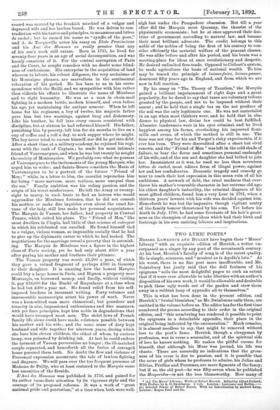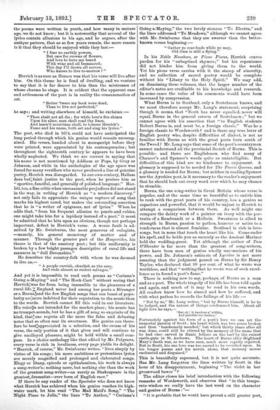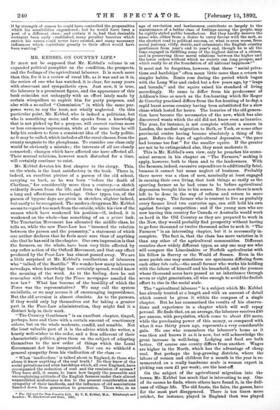TWO LYRIC POETS.*
MESSRS. LAWRENCE AND BIILLEN have begun their " Muses' Library" with an exquisite edition of Herrick, a writer un- surpassed as a singer by any poet of the seventeenth century. At his best, Herrick's faculty of song is of the rarest quality. He is simple, sensuous, and " musical as is Apollo's lute." At his worst, there is no fine poet more insufferable, and Mr. Saintsbury has justly said that the dull foulness of his epigrams "soils the most delightful pages to such an extent that if it were ever allowable to take liberties with an author's disposition of his own work, it would be allowable and desirable to pick these ugly weeds out of the garden and stow them away in a rubbish heap of appendix all to themselves."
This is what has been done in the present edition, and Herrick's " brutal blemishes," as Mr. Swinburne calls them, are omitted in the volume before us. The editor has for the first time numbered the poems according to their order in the original edition, and " this numbering has rendered it possible to print the epigrams in a detachable appendix, their place in the original being indicated by the enumeration." Much remains, it is almost needless to say, that might be removed without loss to the poet's fame. Herrick, though a clergyman by profession, was in verse a sensualist, and of the spiritual side of love he knows nothing. He makes the pitiful excuse for himself, that although his Muse was jocund, his life was chaste. There are assuredly no indications that the gross- ness of his verse is due to passion, and it is possible that the score of girls whom he professes to admire, his Julias and Silvias, Perillas and Perennas, are mere figments of the fancy; but if so, the old poet—he was fifty-seven when he published the Hesperides—is not the less blameworthy. How many of • (1.) The ]fuses' Library : Works of Robert Herrick. Edited by Alfred Pollard. With Preface by A. 0. Swinburne. 2 vols. London : Lawrence and Hunan.— (2.) Selected Poems of Robert Burns. With an Introduction by Andrew Lang. London: Kogan Paul and Co.
the poems were written in youth, and how many in mature age, we do not know; but it is noteworthy_that several of the lyrics contain allusions to his age, and he argues, after the antique pattern, that as so few years remain, the more reason is it that they should be enjoyed while they last:—
" I fear no earthly powers,
But care for crowns of flowers, And love to have my beard With wine and oil besmeared; This day I'll drown all sorrow, Who knows to live to-morrow P "
Herrick is as sure as Horace was that his verse will live after
him. On this theme he is fond of dwelling, and we venture to say that it is far dearer to him than the mistresses of whose charms he sings. It is evident that the apparent ease and artlessness of the poet is in reality the consummation of art.
" Better 'twere my book were dead,
Than to live not perfected,"
he says ; and writing elsewhere of himself, he exclaims :—
" Thou shalt not all die ; for while love's fire shines Upon his altar, men shall read thy lines, And leaned musicians shall, to honour lerriek"s Fame and his name, both set and sing his lyrics."
The poet, who died in 1674, could not have anticipated the long period through which his genius would remain unrecog- nised. His verses, handed about in manuscript before they were printed, were appreciated by his contemporaries ; but throughout the eighteenth century he appears to have been wholly neglected. We think we are correct in saying that his name is not mentioned by Addison or Pope, by Gray or Johnson, and while in the anthologies of the age space was found for many versifiers who never produced a line of genuine poetry, Herrick was disregarded. In our own century, Hallam does but:faint justice to the poet, when he praises him as " sportive, fanciful, and generally of polished language." Haz- litt, too, a fine critic when unreasonable prejudices did not stand in the way, in writing of Herrick as " a modern discovery," not only fails to appreciate the unique rapture of song that marks his highest mood, but makes the astounding assertion that he is "a writer of epigrams, not of lyrics." When he adds that, "from his frequent allusion to pearls and rubies, one might take him for a lapidary instead of a poet," it must be admitted that he hits upon an obvious, though not perhaps important, defect in Herrick's verse. A worse fault is ad- mitted by Mr. Swinburne, the most generous of eulogists, —namely, his general monotony of matter and of manner. Through the greater part of the Hesperides, his theme is that of the amatory poet ; but this uniformity is broken by a few bright passages descriptive of rural life and manners in " dull Devonshire."
He describes the country-folk with whom be was doomed to live as,—
" A people currish, churlish as the seas, And rude almost as rudest salvages."
And yet it is impossible to read such poems as " Corinna's Going a-Maying " and "The Hock-Cart" without seeing that Herrick was far from being insensible to the pleasures of a rural life.:England never had among her poets a Beranger or a Burns,and the few English songs that can boast of popu- larity are more indebted for their reputation to the music than to the. ords. Herrick cannot fill this void in our literature. His voicelis not intended for the market-place; his music has no trumpet-sounds, but he has a gift of song so exquisite of its kind, that:one regrets all the more the false and debasing notes that so often mar its sweetness. His genius can there- fore be bestappreciated in a selection, and the cream of his verse, the only portion of it that gives and will continue to give unalloyed pleasure, might be held within a small com- pass. In a choice anthology like that edited by Mr. Palgrave, every verse is rich in loveliness, every page yields its delight. "Hen-ick, of course," Mr. Swinburne writes, "lives simply by virtue of his songs ; his more ambitious or pretentious lyrics are merely magnified and prolonged and elaborated songs. Elegy or litany, epicede or epithalaminm, his work is always a song-writer's; nothing more, but nothing else than the work of the greatest song-writer—as surely as Shakespeare is the greatest.dramatist—ever born of English race."
If there be any reader of the Spectator who does not know what Herrick has achieved when his genius reaches its high- water mark, let him read " The Mad Maid's Song," " The Night Piece to Julia," the lines "To Anthea," " Corinna's Going a-Maying," the two lovely stanzas "To Electra," and the lines addressed "To Meadows," although we cannot agree with Mr. Swinburne that they are sweeter than the better- known verses beginning :—
" Gather ye rose-buds while ye may, Old time is still a-flying."
In his Noble Numbers, or Pious Pieces, Herrick craves pardon for his " unbaptised rhymes ;" but his repentance did not hinder him from giving them to the world.
Yet his pions verse carries with it the stamp of sincerity, and no collection of sacred poetry would be complete without his " Litany to the Holy Spirit." We may add, on dismissing these volumes, that the larger number of the editor's notes are creditable to his knowledge and research.
In some cases the value of his comments would have been increased by compression.
What Burns is to Scotland, only a Scotchman knows, and we must therefore accept Mr. Lang's statement, surprising though it seems, that "Scott has never equalled, never will equal, Burns in the general esteem of Scotchmen ;" but we cannot agree with his assertion that " to English students Robert Burns is, and must be, a foreign classic." Was he a foreign classic to Wordsworth P and is there any true lover of
English 'poetry who, despite difficulties of dialect, is not as familiar with Burns as with the great poets born south of
the Tweed P Mr. Lang says that some of the poet's countrymen cannot understand all the provincial Scotch of Burns. This is possible : and there are Englishmen who find many of Chanter's and Spenser's words quite as unintelligible. But difficulties of this kind are no hindrance to. enjoyment. A glossary is supposed to be needed for The Faerie Queene, and a glossary is needed for Burns; but neither in reading Spenser nor the Ayrshire poet, is it necessary to the reader's enjoyment that he should look out every word over which he may chance to stumble.
Burns, the one song-writer in Great Britain whose verse is popular, and at the same time so beautiful as to entitle him to rank with the great poets of his country, has a genius so
capacious and powerful, that it would be unjust to Herrick to attempt a comparison between them. As well might one- compare the dainty work of a painter on ivory with the por- traits of a Rembrandt or a Holbein. Sweetness is allied to
strength in Burns, passion to pathos, humour or satire to a. tenderness that is almost feminine. Scotland is rich in love- songs, but in none that touch the heart like his. Come under his spell, and he holds you as securely as the Ancient Mariner held the wedding-guest. Yet although the author of Tam. O'Shanter is far more than the greatest of song-writers, there have been men of genius wholly unconscious of his power, and Dr. Johnson's estimate of Lycidas is not more amazing than the judgment passed on Burns by Sir Henry Taylor, who declared that 99 per cent. of what he wrote was worthless, and that " nothing that he wrote was of such excel- lence as to found a poet's fame."
There is nothing new to say, perhaps, of Burns as a man and as a poet. The whole tragedy of his life has been told again and again, and much of it may be read in his own words.
All readers know how he sinned and how he suffered, and with what pathos he records the failings of his life :—
" Not by us," Mr. Lang writes, " but by Burns himself, is he to be judged, and the nature of things condemned him. About all light love he says,—
'Bat oh 1 it hardens a' within, And petrifies the feeling.'
Fortunately against his form of a poet's love we can sat the immortal passion of Scott : his heart which was two years broken and then handsomely mended,' but which thirty years after all was done, could still be stirred by the memory of the name that he had once carved in Runic letters on the turf by the ruined castle-gate in St. Andrews. The heart of Burns after Highland Mary's death was, as we have seen, much more rapidly repaired. But to Scott, his one love was too sacred to be versified upon. In his longer poems and his novels alone, that memory moves enchanted and disguised."
This is beautifully expressed, but it is not quite accurate. Has Mr. Lang forgotten the lines written by Scott in the hour of his disappointment, beginning " The violet in her greenwood bower " The editor closes his brief introduction with the following remarks of Wordsworth, and observes that "in this tempe- rate •wisdom we really have the last word on the character and genius of Burns :"—
" It is probable that he would have proved a still greater poet,
if by strength of reason he could have controlled the propensities which his sensibilities engendered ; but he would have been a poet of a different class ; and certain it is, had that desirable restraint been early • stablished, many peculiar beauties which enrich his verses could never have existed, and many necessary influences which contribute greatly to their effect would have been wanting."




































 Previous page
Previous page